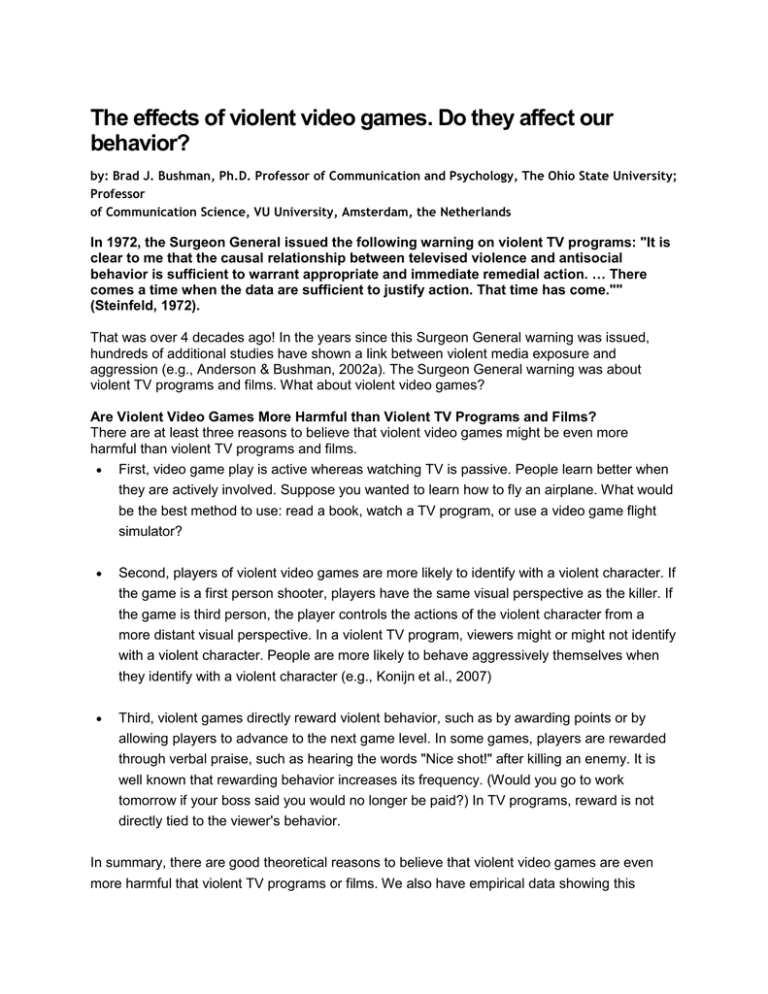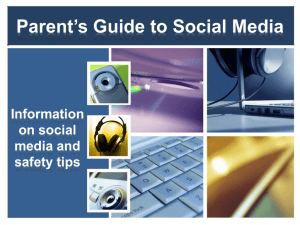The Effects of Violent Video Games on Behavior
advertisement

The effects of violent video games. Do they affect our behavior? by: Brad J. Bushman, Ph.D. Professor of Communication and Psychology, The Ohio State University; Professor of Communication Science, VU University, Amsterdam, the Netherlands In 1972, the Surgeon General issued the following warning on violent TV programs: "It is clear to me that the causal relationship between televised violence and antisocial behavior is sufficient to warrant appropriate and immediate remedial action. … There comes a time when the data are sufficient to justify action. That time has come."" (Steinfeld, 1972). That was over 4 decades ago! In the years since this Surgeon General warning was issued, hundreds of additional studies have shown a link between violent media exposure and aggression (e.g., Anderson & Bushman, 2002a). The Surgeon General warning was about violent TV programs and films. What about violent video games? Are Violent Video Games More Harmful than Violent TV Programs and Films? There are at least three reasons to believe that violent video games might be even more harmful than violent TV programs and films. First, video game play is active whereas watching TV is passive. People learn better when they are actively involved. Suppose you wanted to learn how to fly an airplane. What would be the best method to use: read a book, watch a TV program, or use a video game flight simulator? Second, players of violent video games are more likely to identify with a violent character. If the game is a first person shooter, players have the same visual perspective as the killer. If the game is third person, the player controls the actions of the violent character from a more distant visual perspective. In a violent TV program, viewers might or might not identify with a violent character. People are more likely to behave aggressively themselves when they identify with a violent character (e.g., Konijn et al., 2007) Third, violent games directly reward violent behavior, such as by awarding points or by allowing players to advance to the next game level. In some games, players are rewarded through verbal praise, such as hearing the words "Nice shot!" after killing an enemy. It is well known that rewarding behavior increases its frequency. (Would you go to work tomorrow if your boss said you would no longer be paid?) In TV programs, reward is not directly tied to the viewer's behavior. In summary, there are good theoretical reasons to believe that violent video games are even more harmful that violent TV programs or films. We also have empirical data showing this (Polman et al., 2008). In this study, children were randomly assigned to play a violent video game or watch someone else play it. There was also a nonviolent video game control condition. The results showed that boys who played a violent video game were more aggressive afterwards than were boys who merely watched. Are Violent Video Games Good For You? Some people claim that violent video games are good for you. Some players believe that violent video games are cathartic (i.e., they allow players to release pent up anger into harmless channels). The scientific evidence directly contradicts this idea. Over 130 studies have been conducted on over 130,000 participants around the world (Anderson et al., 2010). These studies show that violent video games increase aggressive thoughts, angry feelings, physiological arousal (e.g., heart rate, blood pressure), and aggressive behavior. Violent games also decrease helping behavior and feelings of empathy for others. Other people claim that playing violent games increases eye-hand coordination, and research supports this claim (e.g., Green & Bavelier, 2007). However, violent content might not be required to obtain these beneficial effects. Perhaps similar video games without violence would also increase eye-hand coordination. Why Do People Deny the Harmful Effects of Violent Video Games? Although the scientific evidence clearly shows that violent video games have harmful effects, many people still deny these effects, especially violent game players. There are at least four reasons why. First, people may think: "I play violent video games and I've never killed anyone." This fallacious reasoning is a good example of how the "availability heuristic" coupled with the "base rate problem" (Kahneman & Tversky, 1973) distort reasoning. People have great difficulty judging influences on events when the base rate probability of the event is very low. It is not surprising that people who play violent video games have not killed anyone because very few people kill anyone. For example, fewer than 6 people per 100,000 are murdered each year in the United States (U.S. Federal Bureau of Investigation, 2010). It is very difficult to predict rare events, such as murder, using exposure to violent video games or any other factor. However, murder is the most salient violent event to most people; so when they don't have "available" in memory cases of people playing violent games and then murdering, they ignore the base rate of murder and conclude that violent games have no effect on aggression. Second, researchers have also found that people believe the media have a much stronger effect on others than on themselves. This effect is very robust and is called the third person effect (e.g., Davison, 1983). The consequence of this psychological effect is that people may often agree that media violence has a bad effect on some people, but not on themselves. This thinking then leads to a denial of the overall importance of the effects from a public health standpoint. Third, the entertainment industry frequently claims that violent media do not increase aggression (Anderson & Bushman 2002b). Even though the public may recognize that making such claims is in the economic self-interest of the entertainment industry, the repetition of the claims of no effects still seems to have an effect. Since the 1972 Surgeon General warning, the scientific evidence has grown even stronger (see Figure 1). But an analysis of over 600 news reports shows that over time, news stories are more likely to deny the harmful effect of media violence (see Figure 1). Most Americans aren't even aware that the U.S. Surgeon General issued a warning about TV violence. Perhaps this is because most Americans get their information from the mass media. The entertainment industry is probably reluctant to admit that they are marketing a harmful product, much like the tobacco industry was reluctant to admit that they were marketing a harmful product. Fourth, people do not understand psychological processes as well as they understand biological processes. If you see a violent video game player assault another person, it is difficult to know the direct cause of the assault. Was it playing violent video games for hours on end, or was it something else? The psychological process by which playing violent video games produces this result is not as intuitive to most people as are biological processes. People are probably more accepting of the idea that smoking causes lung cancer, for example, because it is much easier to grasp the idea that smoke going into the lungs, damages cells, and starts tumor growth. These processes combine to create an atmosphere in which non-expert journalists, and even some social scientists, write articles and books arguing that violent video games are not harmful. However, the vast majority of social scientists working in the area believe that violent video games can be harmful (e.g., Pollard Sacks, Bushman, & Anderson, 2011).





